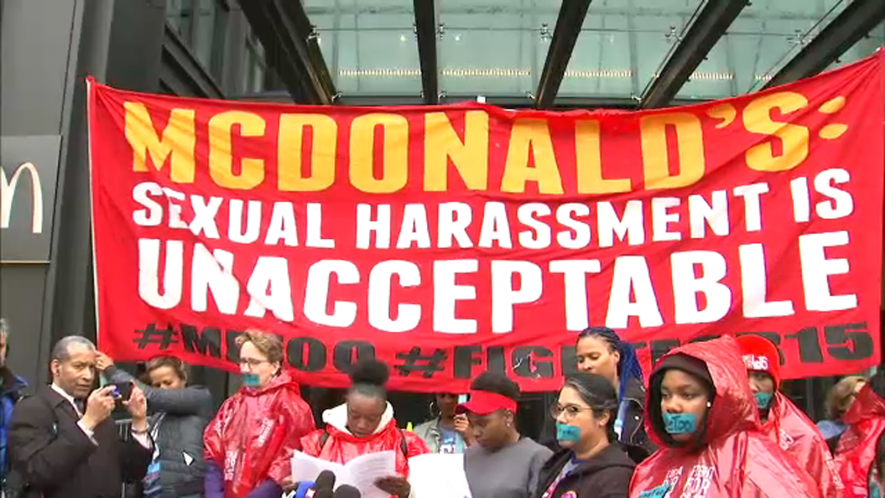McDonald’s Employees Protest Sexual Harassment And Low Minimum Wage Ahead of Shareholders’ Meeting

In the run up to its annual shareholder meeting, fast food giant McDonald’s is facing a slew of nationwide protests from its employees. Workers are protesting the company’s inadequate response to sexual harassment allegations as well as its minimum wage and labor rights policies.
The first wave of protests came on May 21, after 25 current and former employees across 20 cities in the country filed a series of complaints and lawsuits against the company, claiming sexual harassment on the job.
Employees gathered at McDonald’s Chicago headquarters, holding signs and sharing testimonies of their harassment with the crowd. Brittany Hoyos, a former McDonald’s worker and a participant in Tuesday’s protests, said that she was 16 when she was harassed by her manager. After her parents reported the misconduct, Hoyos faced retaliation at work and was eventually terminated. Her mother, Maribel Hoyos, who was employed in the same McDonald’s, was forced to quit after she refused to retract her complaint.
Another protester, 23-year-old single mother Jameilia Fairley, hoped her participation in the protest would bring change. She was harassed while working in a corporate owned McDonald’s in Sanford, Florida. “I want her [my daughter] to be proud of me and know that her mom stood up for what is right,” she said.
Of the 25 complaints, 20 were brought to the Equal Employment Opportunity Commission (EEOC), three were civil rights lawsuits, and two were tied to previous complaints. Workers claimed that the company has been protecting liable executives by either dismissing complaints against them as hearsay or by retaliating against employees by withholding pay, creating a hostile work environment or terminating them. The complaints of inappropriate behavior came from corporate stores as well as franchise stores.
The lawsuits and charges were brought forward with the help of the Fight for $15 organization, with legal support from the American Civil Liberties Union (ACLU) and the other legal firms, as well as financial support from the TIME’S UP Legal Defense Fund.
This is not the first instance of outrage against what seems to be a strongly entrenched culture of unpunished sexual misconduct at the company. In September 2018, workers at McDonald’s restaurants in 10 cities across the United States staged a walkout against the company’s mishandling of sexual abuse allegations. In response, McDonald’s had assured its workers that it would revise its policy and work towards creating a safer environment for the employees. However, the workers said that the company has not fulfilled its promises.
McDonald’s has been shirking responsibility by claiming that it is not a joint employer of franchise stores, and thus it cannot be held legally accountable for sexual misconduct or any other illegal workplace behavior at any of these stores. Workers reject this saying that the company has too much control over them and the franchise restaurants to make that claim.
The company has been using the same argument to avoid setting hourly pay rates for all workers and to deny them the right to bargain through a labor union. This has pushed the employees to launch a second round of protests on May 23, the same day that McDonald’s is holding its annual shareholders meeting. Workers from 13 cities are planning to stage a strike to demand the right to unionize and bargain collectively with the company.
According to the National Employment Law Project, more than 30% of US workers now live in States that are raising pay to USD 15 an hour. The number is likely to go up. This change has been made possible by a series of sustained workers’ protests, led by organizations like ‘Fight for 15’. Started in 2012, Fight for 15 has been at the forefront of mobilizing workers across industries to demand a USD 15 minimum wage and the right to unionize without retaliation. Pressure exerted by these protests has pushed many states and corporate juggernauts, including Amazon, Target and Costco, to raise their minimum wage.
McDonald’s has been an opposing a USD 15 minimum wage for years now. It has used tactics like docking workers’ pay and enlisting the help of law enforcement to deter employees from protesting. After years of relentless mobilizations, all that the company has managed to do so far is vow to no longer lobby against minimum wage hikes at the State and federal levels.
Get the latest reports & analysis with people's perspective on Protests, movements & deep analytical videos, discussions of the current affairs in your Telegram app. Subscribe to NewsClick's Telegram channel & get Real-Time updates on stories, as they get published on our website.
























